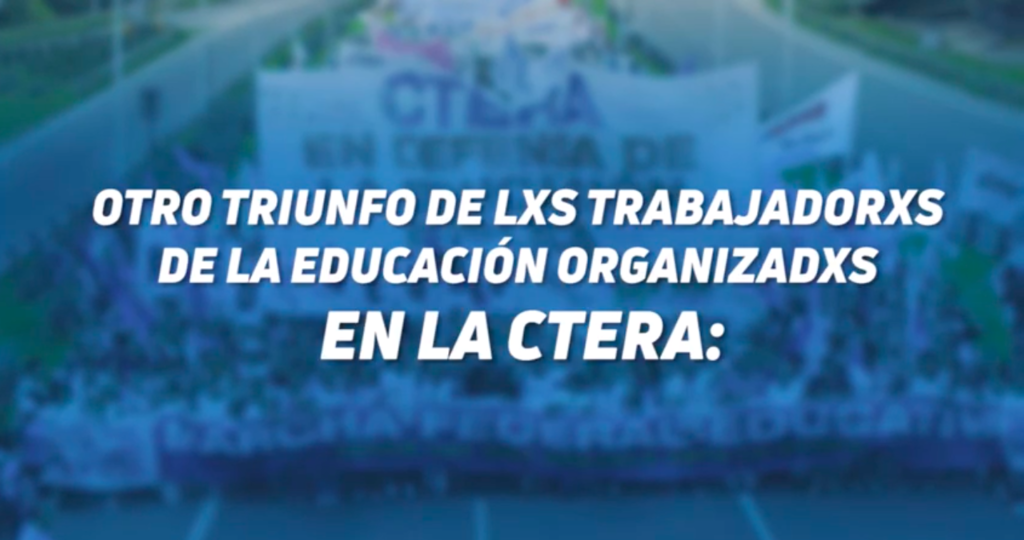Labour Conditions, schools infrastructure; remote work: virtual education in the pandemia context
In CTERA’s recently negotiation process with the Ministery of Labour and the Ministery of Education of Argentina, The teachers, present 12 points about Labour Conditions, schools infrastructure; remote work: virtual education in the pandemia context (respect for privacy, to the load of working hours, to rest and to disconnection); licenses and wages, union and labor rights, work accident coverage and in-service teacher training. Also on the return to the fase-to-face classes, which must be resolved with the consensus of the Education Workers at the national level and in the respective jurisdictions. We share the 11 points of agreement reached by CTERA.
Confederation of Education Workers of the Argentine Republic – Confederación de Trabajadores de la Educación de la República Argentina (CTERA)

- To recognize as teaching work in a virtual or non-face-to-face context that which is carried out from the home of the workers or from another area without the presence of students, until the restoration of face-to-face activities in educational institutions is arranged (constituting a referential normative framework the ILO Convention, #177 on home work, approved by law #25.800); without prejudice to the experiences mediated by information and communication technologies that take place in rural, home and hospital modalities, in confinement contexts, youth and adults, and in higher education, in accordance with the provisions of article 109 of the law #26.206.
- Communication and information technologies. This task will be carried out using communication and information technologies suitable to be applied in virtuality. It is hereby agreed that this form of work will be carried out while the restriction of the teaching of face-to-face classes in educational establishments is extended as a consequence of the emergency derived from the COVID-19 pandemic; without prejudice to the continuity of the experiences mentioned in point 1.
- Remuneration and licenses. Teachers within the framework of this extraordinary context of performance of their activity retain their full rights to receive the salary that corresponds to them according to the jurisdictional norms and / or corresponding joint agreements with adjustment to the coverage mechanisms that are necessary as a consequence of those , with the adjustments that are established at the jurisdictional level, attentive to the emergency and in accordance with the statutes and particular rules of application.
- Working day which is carried out from the workers’ home or from another area without the presence of students, until the restoration of face-to-face activities in educational institutions is provided (constituting a normative framework of reference to the ILO Convention, #177 on home work, approved by Law #25.800); without prejudice to the experiences mediated by information and communication technologies that are developed in rural, home and hospital modalities, in confinement contexts, youth and adult, and in higher education, in accordance with the provisions of article 109 of the Law #26.206.
- Work risks. In all cases, coverage of occupational risks, including accidents and professional illnesses, must be ensured for teaching work in a virtual or non-face-to-face context, in accordance with the applicable legal framework and regulations in each jurisdiction.
- Unionization. Teaching work in a virtual or non-classroom context regulated in this agreement must allow the full enjoyment and exercise of union rights.
- Technological resources. The technological resources existing at the national and jurisdictional levels are available to teachers in order to facilitate the development of their tasks in the virtual environment and efforts will be made to expand them according to the availability of employers; committing the Ministry of Education of the Nation to propose a progressive program to promote access to them by teachers, collaborating with the development of their tasks.
- Teacher training. The Ministry of Education of the Nation will support free in-service teacher training actions for virtual work during this period with the participation of union organizations.
- Health and hygiene. For the resumption of the face-to-face activities, the necessary precautions must be taken so that the health and hygiene conditions of the educational establishments are adequate for the preservation of the health of the teachers, the students, the directive and auxiliary personnel dedicated to the educational work; ratifying what was agreed by the Joint Act dated February 22, 2011, point 4 as it states: “Accept the basic prevention recommendations prepared by the Superintendency of Work Risks under the Ministry of Labor, Employment and Social Security, for educational centers from the country”.
- Specific protocols. Without prejudice to the foregoing, the parties agree that additional specific rules and protocols regarding teaching work in virtual or non-face-to-face and also for the return to face-to-face activities at the national and jurisdictional level established for this purpose.
11. Agreement and evaluation. The parties agree to meet within a period of thirty days in order to evaluate the application of this agreement and analyze the public evolution of private management, a meeting will also be held within the same period in the particular area of negotiation in accordance with the legal regime statutory application.



